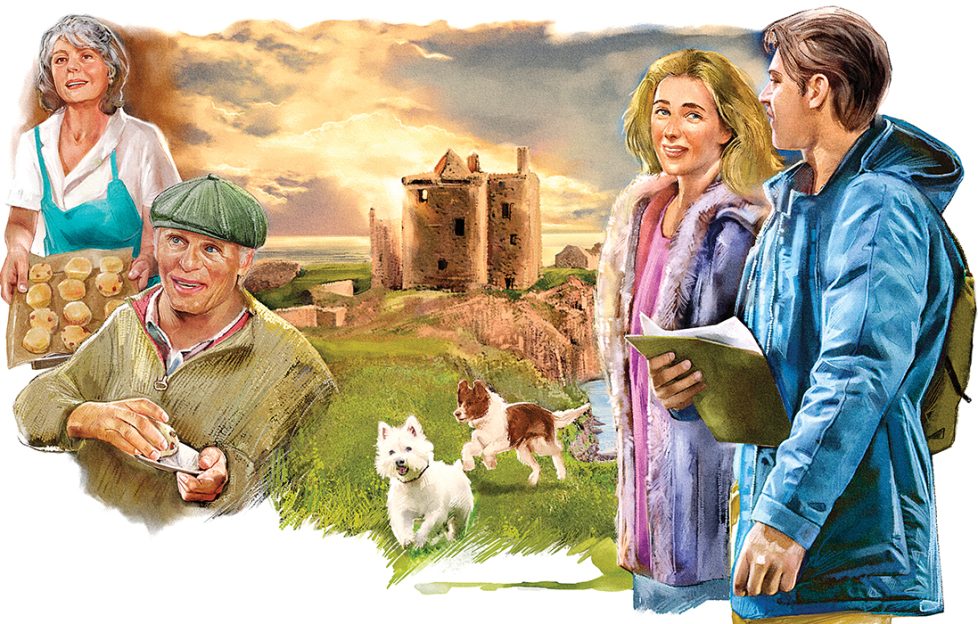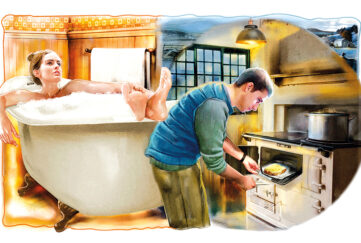There’s Always Tomorrow – Episode 15

There's Always Tomorrow by Mark Neilson
« Previous Post- 12. There’s Always Tomorrow – Episode 12
- 13. There’s Always Tomorrow – Episode 13
- 14. There’s Always Tomorrow – Episode 14
- 15. There’s Always Tomorrow – Episode 15
- 16. There’s Always Tomorrow – Episode 16
- 17. There’s Always Tomorrow – Episode 17
- 18. There’s Always Tomorrow – Episode 18
“Bravo!” Helen cried.
“But you’re English!” Larry laughed. “You should be hissing and booing.”
“No way. I’m with these feisty women. Was that story your surprise?”
Helen felt almost part of the tale. The escape route the minister’s wife and her maid had taken could have been along the path only a few feet away.
“That was the end of the first part,” Larry said. “In the interlude between acts we can have our picnic. I brought some scones.”
“Where did you buy them?” she asked. “Inverbervie?”
It was a source of frustration to her that there was no local shop, and every top-up of food would need a trip to Inverbervie or Stonehaven.
“Buy them? I made them,” Larry declared.
“You can bake?” Helen was astonished.
“I’m a sergeant,” he said grandly. “Trained to cope with all emergencies.”
Lorna found the library in Montrose and was a little disappointed not to find the dragon lady from Wullie’s tale.
Instead, a pleasant-faced librarian steered her to the reference books.
Perhaps the dragon lady had existed only in Wullie’s mind, from his boyhood days. As a farmer, he was unlikely to have found much time to read.
She browsed along the shelf, selecting two books on 19th-century social history.
There was nothing in the first, and a three-page reference to co-operatives in the second.
There was little there she didn’t already know, but it was useful to have a quick refresher course.
Carefully replacing the books, she searched again.
Nothing.
“Have you found what you’re looking for?” the librarian asked, materialising at her elbow.
“No,” Lorna admitted. “I’m trying to find out how to set up a co-operative enterprise for a rural village.”
The librarian frowned.
“Why do you want to set up your own co-operative?” she asked.
“To provide a shop,” Lorna explained. “I live in a village behind Inverbervie where the only shop closed down years ago.
“Everyone is dependent on their car or ordering online. There’s nowhere to buy small bits and pieces.”
“But if the previous shop failed, are there enough customers to support a replacement?”
“My thinking is to reopen it to provide a service for locals, not to earn a profit,” Lorna explained.
“If the shop provides a range of basic goods, that will surely attract some customers.”
“It’s not a co-operative you need,” the librarian informed her. “It’s a community shop. They’re springing up all over, especially in rural areas.
“They’re run by the locals for themselves and as a focal point for the community.
“It’s a place where people can meet to have a home-made cake and a cup of coffee.”
“That’s exactly what I’m looking for!” Lorna cried. “Have you anything on these community shops?”
“Not in the shape of books.” The librarian smiled.
“But if you Google ‘community shops’, there’s bound to be information.”
Lorna groaned.
“I haven’t got myself a computer yet.”
“We’ve a couple of computers here in the library for a small charge.”
“I’ll pay it,” Lorna said immediately. “Whatever it costs.”
“Let’s find out first if it’s worth paying.” The librarian smiled. “Then set the charge.”
She led the way to a table where a couple of old computers sat, then sat down and keyed in the library security code.
They waited for what seemed like an eternity until the screen responded.
“In a perfect world, we would have funds to replace these every few years.” The librarian sighed.
“But there’s so little cash to spare that we’re left with these two which came off Noah’s Ark.”
She prodded the keyboard a couple of times and was rewarded with a Google search menu, then entered the words Community Shops.
The librarian glanced down the entries.
“There’s lots of stuff,” she said. “And there seems to be a foundation to give guidance on starting up your own.
“I’ll leave you to search through what’s here,” she went on. “Take your time.”
The computer behaved even more slowly for Lorna’s less-experienced hands, but she read, utterly absorbed, for an hour.
Then she filled in an application form to the Plunkett Foundation, asking for further information and a starter pack.
She typed in her new address for the first time, then looked at it.
Even on the screen, it was starting to sound a bit more like home.




